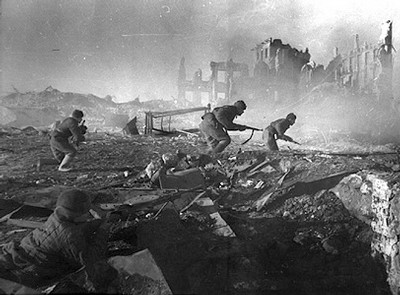"Inatt finns ingen väg tillbaks..."
 Ever since returning from Sweden, I've had some strange attraction to novels and films depicting the human experience at war.
Ever since returning from Sweden, I've had some strange attraction to novels and films depicting the human experience at war. I've rewatched Francis Ford Coppola's Apocalypse Now and Andrei Tarkovsky's Ivan's Childhood, and attempted to finish (and this time fully appreciate) Terrence Malick's The Thin Red Line on multiple occasions -- though, sadly, most of these occasions were between the hours of 3 and 4 in the morning, and I would slip into unconsciousness after a half-hour or so.
Yesterday, I picked up Norman Mailer's The Naked and the Dead and received Joel Turnipseed's Baghdad Express in the mail, a purchase made solely on the recommendation of my roommate. What sealed the deal was when Alan said that there was a controversy focused around William Broyles, Jr., the screenwriter who adapted Tony Swofford's memoir into the largely overlooked and ignored Sam Mendes film Jarhead, over whether sections of Baghdad Express were used in the Jarhead script without permission.
At the beginning of the summer, I found myself tearing through the works of Henry Miller, and still have the last third of Tropic of Capricorn to finish, leafing back through the highlighted and annotated pages of my Sartre novels, finally taking a turn at Albert Camus' The Fall and Fyodor Dostoevsky's Notes from Underground while en route to Scandinavia (both novels now sit, in various stages of completion, on the top of the sizable piles of texts that have formed a monument of sorts next to my bed)... and yet from these absurdist/existentialist/stream-of-consciousness explorations of human existence in Paris, New York, Amsterdam, and [St.] Petersburg, I now find myself attracted to analyses of the horrors of war on the human mind; the affect of war, not as seen in headlines or read in the paragraphs of history books, but on the individuals whose orders were to kill until directed to do otherwise, for the safety and security of their families at home, for the "betterment of the world," for, ironically, another attempt at a peace.
Despite the fact that America is engaged in two wars in the Middle East, both of which are extensively covered by this nation's reputable newspapers, it seems as though most people's opinions of the wars are based on sheer, at times almost feral, emotion, and not on any of the materials and facts all too available on the internet. In my previous post, I linked to a story in the World Politics Review about why a "Surge-like" strategy would not work in Afghanistan... I have serious doubts that many who voice their opinions so loudly about America At War have even glanced over articles like this.
Like a woman's right to choose, capital punishment, and the rights of homosexual couples, the wars in Iraq and Afghanistan have become ideologically divisive issues. John McCain has said that Barack Obama "would rather lose the war than the campaign." Those of us who have criticized George W. Bush's decision to go to war since the beginning have been labeled "unpatriotic" and "un-American." It has also been brought to my attention by a number of my countrymen who align themselves with the Republican Party or a Conservation Ideology that, because I do not support the War in Iraq, I therefore do not (and, because of my stance, can not) support the American troops in these theaters of war... and anyone who does not support our troops, our president, and our country in this time of war is nothing short of a coward and sorry excuse for an American.
I wonder what these people would make of Alan Rogers, an exemplary American solider who also happened to be a homosexual.
The saddest fact of all is that all this chest-thumping and hollering about the Spread of Democracy to the Darkest Corners of the World overlooks something rather important: young American men and women are fighting and dying for a war that was sold to the American public packaged in lies and half-truths. This fact is no longer in dispute. Even if the Iraq War was legal and morally just (and this question of the morality of war opens a can of worms that I'm still not quite sure how to untangle), soldiers are dying, civilians too. War should never be about forcefully imprinting one's beliefs on another culture, but a frightening last resort. War should not be a divisive political issue, but something that should make us all fearful that events led us to that point... and because of this sickening aspect of war, the loss of life on all sides, no one should be called "unpatriotic" because they are against violence and death, and every informed opinion should be allowed to enter the public discussion without ridicule or theatric shows of disgust.
Kommentarer
Trackback